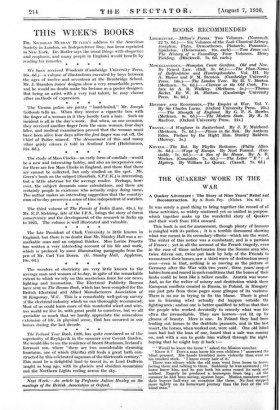THE QUAKERS' WORK IN THE WAR
IT was surely a good thing to bring together the record of all those activities, so widely scattered yet so unified in purpose. which together make up the wonderful story of Quakers and their work from 1914 onward.
This book is not for amusement, though plenty of humour is mingled with its pathos ; it is a terrible document showing what war meant in its secondary effects-which are the worst, The writer of this notice was a combatant, and is a partisan of France ; yet in all the account of the French' tragedy, even in the case of those unfortunates froth the Somme area who, twice driven out, twice put back by help of the Friends' to reconstruct their homes, saw a third wave of destruction sweep over--even in that, nothing is so moving as the picture of Germany after the War with two years', three years' crop of babies born and reared in such conditions that the bones of their limbs could be bent like a tallow candle. Austria was worse. And, as for the welter of misery and destitution which these European conflicts created in Russia, in Poland, in Hungary; one just gets from these pages some glimpse of its vastness. There is no use in trying to fix the blame. There is great use in learning wl-pit actually did happen outside the fighting area ; and no one is better qualified to tell us that than the people who worked devotedly to remedy what was too often the irremediable. They saw horrors-yet lit up by gleams o'f 'beauty. Here is one. In Poland they had been lending out horses to the destitute peasants, and in the last resort, the horses, when worked out, were sold. One old blind man had had the loan of one, heard that a sale was coming on, and with a son to guide him walked through the night, hoping that he might buy it back :- " Would he know the horse ? ' asked the Mission member.
Know it ? Does a man know his own children ? ' answered the blind peasant. His hands trembled more violently than ever on his crooked stick. I know every hair of it.'
Thero was silence while the old man went from horse to horse, feeling them and talking to them. Suddenly he was answered; the horse knew him, and he put both his arms round its neck and sobbed. Eagerly he produced a homespun linen bag ; all the summer he had been saving, against hope. Mission members meet their buyers half-way on occasions like these. No foot stepped more lightly on its homeward journey than the foot of the old blind man."






































 Previous page
Previous page